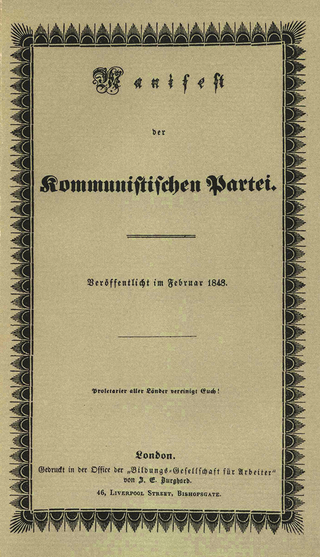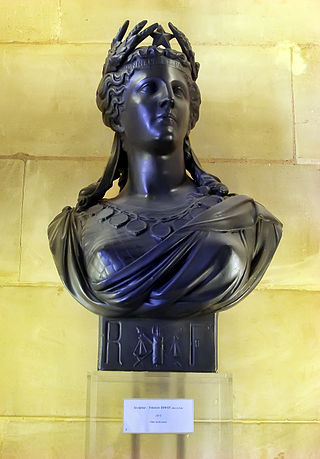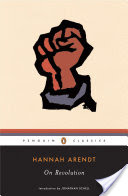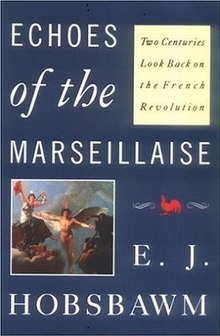
The Declaration of the Rights of Man and of the Citizen, set by France's National Constituent Assembly in 1789, is a human civil rights document from the French Revolution. Inspired by Enlightenment philosophers, the Declaration was a core statement of the values of the French Revolution and had a significant impact on the development of popular conceptions of individual liberty and democracy in Europe and worldwide.

The French Revolution was a period of political and societal change in France that began with the Estates General of 1789, and ended with the coup of 18 Brumaire in November 1799 and the formation of the French Consulate. Many of its ideas are considered fundamental principles of liberal democracy, while its values and institutions remain central to modern French political discourse.

The Communist Manifesto, originally the Manifesto of the Communist Party, is a political pamphlet written by Karl Marx and Friedrich Engels, commissioned by the Communist League and originally published in London in 1848. The text is the first and most systematic attempt by Marx and Engels to codify for wide consumption the historical materialist idea that "the history of all hitherto existing society is the history of class struggles", in which social classes are defined by the relationship of people to the means of production. Published amid the Revolutions of 1848 in Europe, the Manifesto remains one of the world's most influential political documents.

Marianne has been the national personification of the French Republic since the French Revolution, as a personification of liberty, equality, fraternity and reason, as well as a portrayal of the Goddess of Liberty.

The historiography of the French Revolution stretches back over two hundred years.

Ernesto Laclau was an Argentine political theorist and philosopher. He is often described as an 'inventor' of post-Marxist political theory. He is well known for his collaborations with his long-term partner, Chantal Mouffe.
The Great Fear was a general panic that took place between 22 July to 6 August 1789, at the start of the French Revolution. Rural unrest had been present in France since the worsening grain shortage of the spring. Fuelled by rumours of an aristocrats' "famine plot" to starve or burn out the population, both peasants and townspeople mobilised in many regions.
An imagined community is a concept developed by Benedict Anderson in his 1983 book Imagined Communities to analyze nationalism. Anderson depicts a nation as a socially-constructed community, imagined by the people who perceive themselves as part of a group.

Liberté, égalité, fraternité, French for 'liberty, equality, fraternity', is the national motto of France and the Republic of Haiti, and is an example of a tripartite motto. Although it finds its origins in the French Revolution, it was then only one motto among others and was not institutionalized until the Third Republic at the end of the 19th century. Debates concerning the compatibility and order of the three terms began at the same time as the Revolution. It is also the motto of the Grand Orient and the Grande Loge de France.

"La Carmagnole" is the title of a French song created and made popular during the French Revolution, accompanied by a wild dance of the same name that may have also been brought into France by the Piedmontese. It was first sung in August 1792 and was successively added to during the revolutionary events of 1830, 1848, 1863–64, and 1882-83. The authors are not known. The title refers to the short jacket worn by working-class militant sans-culottes, adopted from the Piedmontese peasant costume named for the town of Carmagnola.
Jonathan Charles Douglas Clark is a British historian of both British and American history. He received his undergraduate degree at Downing College, Cambridge. Having previously held posts at Peterhouse, Cambridge and All Souls College, Oxford into 1996, he has since held the Joyce C. and Elizabeth Ann Hall Distinguished Professorship of British History at the University of Kansas.
New Times was an intellectual movement among leftists in Great Britain in the late 1980s. It was centred on the Eurocommunist faction of the Communist Party of Great Britain (CPGB), and most of the intellectual groundwork for the movement was laid out in the latter party's official theoretical journal, Marxism Today.

Citizens: A Chronicle of the French Revolution is a book by the historian Simon Schama, published in 1989, the bicentenary of the French Revolution.
"The terror," declared Schama in the book, "was merely 1789 with a higher body count; violence ... was not just an unfortunate side effect ... it was the Revolution's source of collective energy. It was what made the Revolution revolutionary." In short, “From the very beginning [...] violence was the motor of revolution.” Schama considers that the French Revolutionary Wars were the logical corollary of the universalistic language of the Declaration of the Rights of Man and of the Citizen, and of the universalistic principles of the Revolution which led to inevitable conflict with old-regime Europe.
Liberalism is a political and moral philosophy based on the rights of the individual, liberty, consent of the governed, political equality, right to private property and equality before the law. Liberals espouse various and often mutually warring views depending on their understanding of these principles but generally support private property, market economies, individual rights, liberal democracy, secularism, rule of law, economic and political freedom, freedom of speech, freedom of the press, freedom of assembly, and freedom of religion, Liberalism is frequently cited as the dominant ideology of modern history.
The International Committee of the Fourth International (ICFI) is a public faction of the Fourth International founded in 1953. Today two Trotskyist internationals claim to be the continuations of the ICFI; one with sections named Socialist Equality Party which publishes the World Socialist Web Site, and another linked to the Workers Revolutionary Party in the UK.

Eric John Ernest Hobsbawm was a British historian of the rise of industrial capitalism, socialism and nationalism. His best-known works include his tetralogy about what he called the "long 19th century" and the "short 20th century", and an edited volume that introduced the influential idea of "invented traditions". A life-long Marxist, his socio-political convictions influenced the character of his work.

The Age of Extremes: The Short Twentieth Century, 1914–1991 is a book by Eric Hobsbawm, published in 1994. In it, Hobsbawm comments on what he sees as the disastrous failures of state socialism, capitalism, and nationalism; he offers an equally sceptical take on the progress of the arts and changes in society in the latter half of the twentieth century.

Symbolism in the French Revolution was a device to distinguish and celebrate the main features of the French Revolution and ensure public identification and support. In order to effectively illustrate the differences between the new Republic and the old regime, revolutionaries implemented new symbols to be celebrated instead of the old religious and monarchical symbolism.

On Revolution is a 1963 book by the political theorist Hannah Arendt, who presents a comparison of two of the main 18th-century revolutions: the American Revolution and the French Revolution.
Modernization theory is the predominant explanation for the emergence of nationalism among scholars of nationalism. Prominent modernization scholars, such as Benedict Anderson, Ernest Gellner and Eric Hobsbawn, say nationalism arose with modernization during the late 18th century. Processes that lead to the emergence of nationalism include industrialization and democratic revolutions.













